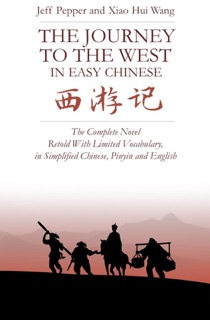This book contains the complete text, in Chinese, pinyin and English, of all 31 books in the best-selling Journey to the West series of graded readers by Jeff Pepper and Xiao Hui Wang. If printed in standard paperback format this book would run over 3,500 pages. It is written for people who are learning to read Simplified Chinese and want to enjoy a fascinating story while gaining a better understanding of Chinese history and culture.
Journey to the West is probably the most famous and best-loved novel in China and is considered one of the four great classical novels of Chinese literature. Its place in Chinese literature is roughly comparable to Homer's epic poem The Odyssey in Western literature. Wikipedia sums up the book's role perfectly, saying, "Enduringly popular, the tale is at once a comic adventure story, a humorous satire of Chinese bureaucracy, a spring of spiritual insight, and an extended allegory in which the group of pilgrims journeys towards enlightenment by the power and virtue of cooperation."
This book is NOT a literal translation of the original novel, which was written in the 16th century and is difficult for modern readers. It is a graded reader, which means that it uses a restricted vocabulary of Chinese words and a simple sentence structure. It starts off relatively easy and gradually increases in complexity. For example the first story, Rise of the Monkey King, covers the events in the first two chapters of the novel and uses a vocabulary of just 507 words. The second story, Trouble in Heaven, covers the next two chapters and uses only 431 words. Each chapter adds, on the average, about 30 new words, and so by the time you finish the final story, called The Last Trial, you will have seen over two thousand different Chinese words.
Each paragraph of Chinese is followed by the same paragraph written in pinyin, which is a phonetic method of writing Chinese. The pinyin lets you sound out the word if you don't recognize the characters. We recommend that when you read this on an e-reader, you scroll the text or cover the pinyin with a piece of paper, so that the pinyin is not visible on the screen. Try to read the Chinese characters, and only refer to the pinyin if you are completely stumped by some characters. If you still don't recognize the word, look it up in the glossary at the end of the book.
Every time a Chinese word is used for the first time, it is highlighted and followed by a footnote link. Follow that link to see a definition of the new word. There are also footnote links without highlights, and you can read those to see useful and interesting bits of information about the story and the characters that you encounter.
At the end of the book is a complete English translation of each chapter. This English translation does not necessarily match the Chinese word for word, but you can refer to it to get a general understanding of the meaning of a paragraph.
Finally, there are audiobook versions of all 31 books available. You can use these to listen to a native Chinese speaker tell the story while you follow along with the text. The audiobooks are available on YouTube on the Imagin8 Press channel. You can also download them from the Imagin8 Press website.
The 31 stories in this book are also available as standalone books, in paperback and ebook formats.



















































